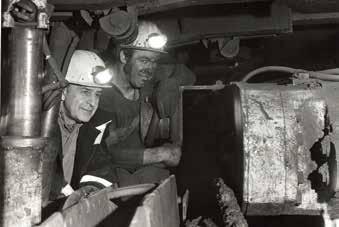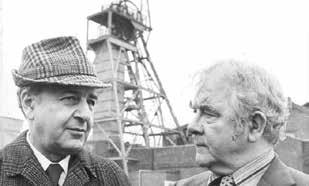
6 minute read
Lord EzraIn Memoriam
IN MEMORIAM
LORD EZRA
Advertisement
Honorary Fellow
Derek Ezra, MBE (military), MA, Hon DSc (Cranfield), Hon LLD (Leeds)). Born 23 February 1919; Educated at Monmouth School, Wales and Magdalene (Major Scholarship and First Class honours in History 1936); USA Bronze Medal 1945; Chairman, National Coal Board 1971–82; Knighted 1974; Honorary Fellow 1977; Grand Officer of the Italian Order of Merit 1979; Commander of the Luxemburg Order of Merit 1981; Officer of the Légion d’ Honneur 1981; created life peer as Baron Ezra of Horsham in the County of West Sussex 1983; Married Julia Wilkins 1950 (d. 2011); Died 22 December 2015, aged 96.
Derek Ezra was born in Tasmania, the son of David, a property developer, and his wife Lillie. He spent his early childhood in France but was educated in England at Monmouth School, Wales from where he went to Magdalene College, Cambridge in 1934 graduating with a first class degree in History specialising in Ancient History. At Cambridge he joined the Mummers, the Union, and Cambridge University Liberal Club, subsequently becoming a committee member. He maintained his affiliation to the Liberal Party when he entered the Lords.
He began his wartime service as a gunner but was quickly moved to work in operational intelligence, analysing information on German troop and railway movements, invaluable in the lead up to D-Day. At the end of the war in Europe, he collated information about the Russian occupied zone for the Supreme Headquarters Allied Expeditionary Force. He was attached to the Control Commission in Germany where his work included evaluations of its coal industry. He was demobbed as a lieutenant-colonel.
Ezra joined the Coal Board as a ‘sales and marketing’ official. When it was nationalised in 1946 the industry had nearly 1,000 collieries in Britain. In 1958 he became manager of the Board’s London and Southern regional sales office and two years later was made director-general of marketing. He became the youngest member of the Board in 1965 at the age of 47 and was appointed deputy chairman two years later. In 1971, as the obvious internal candidate, he beat several leading politicians and industrialists to succeed Lord Robens as chairman of the NCB. He was appointed by Edward Heath and later reappointed by James Callaghan with the support of the NUM.

Wyndham Western Colliery (Photo: National Coal Board South Wales)
Within months of his appointment, the National Union of Mineworkers, under its leader, Joe Gormley, called a national strike over pay to start in January 1972. The government met to consider contingency plans to use troops to move the plentiful pithead coal stocks by road and rail. Ezra warned ministers that any such move would permanently embitter relations with the unions. The miners prevailed, thanks, in part, to Lord Wilberforce’s inquiry, which found that the miner’s wages had been held back and that their pay was low with respect to other industries.
In November 1973 the miners started another militant action, this time an overtime ban. Consequently coal stocks dwindled so that by January 1974 the government imposed a three-day working week on British industry. A second strike in 1974 effectively forced Edward Heath out of office and ended with the miners securing a pay deal which made them the best paid manual workers.
The future of the industry appeared to look up in the wake of the 1973 oil crisis when the Labour administration introduced its 1974 Plan for Coal, promising higher output and higher investment. The NCB incorporated many inefficient pits that were to be closed as part of the Plan for Coal. Whilst the investment component of the plan was instituted, the closures did not take place; productivity fell and the cost of producing each ton of coal rose. The main customers (steel, electricity and to a lesser degree gas), looked overseas and to the open-cast system for cheaper supplies.

Derek Ezra with Joe Gormley at Golborne Colliery, near Wigan, in 1979 (Photo: Kevin Holt)
The recession of the early 1980s made the need for pit closures more urgent. The government did not increase the level of funding and in early 1981 Ezra informed the NUM of impending pit closures but refused to produce a hit-list. However, soon after, a list of fifty collieries was circulated that would have resulted in 30,000 redundancies had it been true. Only 23 pits had been scheduled for closure, of which three had already closed. The source of the larger list remains speculative.
Ezra proposed a joint approach between the NCB and the NUM that relied on governmental pressure to restrict imports of coal as well as an increase in funding. Mrs Thatcher, expecting a further strike and in the knowledge that the nation’s coal stocks remained low, was forced to make a U-turn and agree to the suggestions. Mrs Thatcher, not known for turning, may have been influenced by
this event to depower militant trade unions in the future. Ezra was held to blame for the government’s defeat and it was stated that he would not be offered a third term as chairman.
During his time as Chairman Derek Ezra formed very close ties with Joe Gormley who was president of the NUM for the whole of Ezra’s chairmanship. So much so that he persuaded Gormley to stay on for two years so that they could retire at the same time. In 1982 Ezra left the Coal Board having refused Mrs Thatcher’s pleas for him to stay on for a further year (another U-turn). The fact was that she could not find anyone ‘suitable’ to take on the role, possibly because more militant union officials were known to be lurking in the wings. Ezra joined Joe Gormley in the Lords in 1983. In the Lords he supported manufacturing industry and campaigned for a national industrial strategy, particularly recommending the use of North Sea oil and gas revenues to be used to encourage investment and build infrastructure.
Ezra had to work with another less well-known union the British Association of Colliery Managers that represented the managerial staff of the collieries and the central offices. It was in this context that I met him as my father was actively involved with the organisation.
Ezra lived in interesting times as Chairman of the NCB. During his office the industry lost almost three-quarters of its one million employees. The decline has continued and has led to today’s predicament when we have little prospect of being able to mine the considerable coal stocks that lie beneath the ground. As a lifelong campaigner and ambassador for coal he must have been profoundly saddened by the failure of the industry.
After his retirement he became chairman of an enormous number of disparate enterprises, including Associated Heat Services a private energy company. He was chairman and then president of the Tidy Britain organisation. He was a Liveryman of the Haberdashers’ Company. He wrote two books Coal and Energy (1978) and The Energy Debate (1983).
Lord Ezra generously bequeathed a number of books to the College including parts of his draft autobiography (1983) and, reflecting his life-long Pepysian interests (he shared a birthday with Pepys and he was elected a member of the Pepys Club), biographies and works concerning Pepys.
N R






